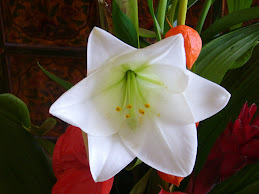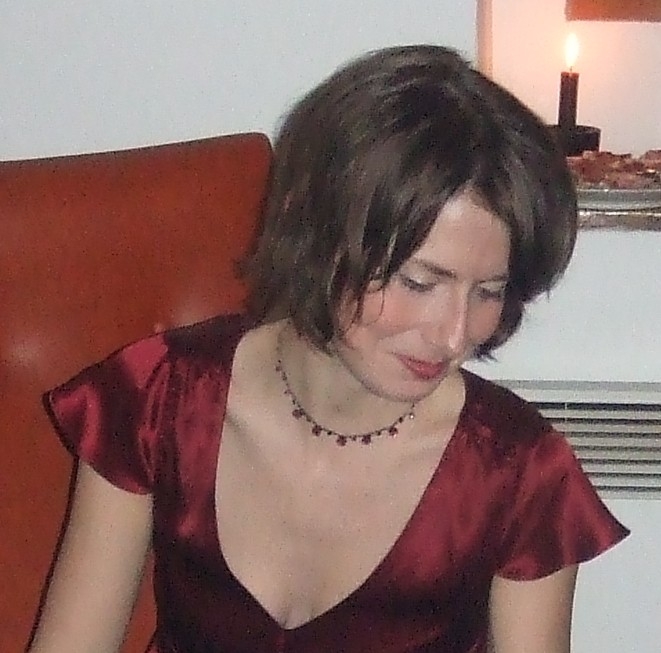 It took me a long time to get the hang of enjoying reading a book in French. I've always loved the pleasure of a good read, but I have to admit that there was often that element of laziness that would creep in -- I wanted to be able to sit back and just relax, actually absorb what I was reading and soak it all in without having to think about it all that much. I know, I know -- lazy reader syndrome, we all get it sometimes, don't we? Or am I alone in this?
It took me a long time to get the hang of enjoying reading a book in French. I've always loved the pleasure of a good read, but I have to admit that there was often that element of laziness that would creep in -- I wanted to be able to sit back and just relax, actually absorb what I was reading and soak it all in without having to think about it all that much. I know, I know -- lazy reader syndrome, we all get it sometimes, don't we? Or am I alone in this?But somewhere along the road I actually fell into a few French books that attracted me by the storyline laid out on the back of one of those austere covers, and I dove in wholeheartedly, trying to figure out what I was missing. Because back in college I probably read many more excerpts of excellent, classic French fiction rather than whole novels, I'm ashamed to say. That was just the way things worked back then, I guess. And it was hard enough for me to pore over 10 pages of Balzac much less fathom 300, what with the balance of my whole courseload weighing me down, so I don't necessarily regret it...
Gradually, after working for a stint in a bilingual bookshop, I fell in love with some more modern French authors (although I am aware of the fact that I have zillions more to discover, unearth and fully appreciate) and I even came to read a certain number of French translations. After falling head-over-heels in love with Murakami in La ballade de l'impossible (more well-known as Norwegian Wood) I also read a number of his other books, and had the opportunity to read his more-recent Kafka on the Shore. And the strangest thing is, aside from the fact that I didn't enjoy the storyline nearly as much as La ballade (and I even had issues with certain elements that I feel spoiled parts of it), I realized that I prefer Murakami in French -- I just feel that his sensual style and his approach to characterization is better represented and better conveyed in French. So I think that I'll probably continue to read most, if not all, of his other books in French.
This may not be all that interesting of an observation, but it just seemed intriguing to me to think that certain authors and their writing come across better in one language more than another. My boyfriend claims that Paul Auster is much better in French than in English, although I still object to this claim, on the grounds that he hasn't actually read Auster in English -- he says that he has an excellent translator, which I believe is altogether true, but I think you would have to compare both versions of the text to actually defend the fact that one language-version is better than the other. But back when The Brooklyn Follies was being released, interestingly enough, it came out in French first, which boggled my mind at the time (I later came to understand that it may have been a favor to his French publisher, Actes Sud, who have always been hugely supportive of him and his writing, but I may be wrong in this surmisal) but didn't stop me from trying Auster out in French -- and I did enjoy it, although I couldn't help thinking that as an American I should be reading him in English.
Which brings me to the topic at hand today (OK, I was a long time in getting here, but bear with me!): I just finished a marvelous novel in French translated from the Norwegian, and I wanted to share it with the 'Net world. It's called La Société des Jeunes Pianistes, and I fell into it by accident while paging through a copy of French Elle one afternoon. The magazine gave it an excellent review, and it sounded tantalizing: I played the piano back when I was a student and have unfortunately not touched the keys in more years than I can remember, but I love all that brings back the nostalgia of that time of my life. I miss listening to Chopin in the Salle Gaveau and studying certain elements of music history. Above all I miss the challenge of a new piece and the fulfillment of performance after months of preparation... When I picked up the book to check it out in person, I saw that the author had included a quote from Murakami's Norwegian Wood in the opening pages, and this was the clincher for me: I knew then that I had to buy it.
The novel's story revolves around the musical passions and aspirations of young Aksel as well as those of his friends, a group of adolescents living in Oslo in the early '60s. I found that you fell immediately into the story and were swept up into his adolescent world of desire, confusion, frustration and self-absorption. He experiences a family tragedy very early in his life that has an enormous impact on him and his future decisions. As you sweep through one chapter after another, you find yourself immersed in the musical world of his experience, and you can really visualize all of the work and sweat that goes into preparing for these concerts and concours. And you can also almost feel the music floating off the pages. Perhaps that's an over-romanticized way of putting it, but this is exactly how I felt as I read the book.
I'm not sure if an English translation exists as of yet, but I highly recommend this to those francophones in my entourage who are eager to discover an enjoyable book in French, something refreshing and unexpected. I am of course a big fan of coming-of-age novels, always have been, which I believe the French refer to as romans d'apprentissage, and if you too enjoy that genre this one is not to be missed.
Now let's see if I can make time for Nancy Huston's latest offering. After reading so many rave reviews, and even the controversy surrounding the English translation thanks to Maitresse (who really convinced me that I have to read Huston; I feel so out of it), I've really got to get my act in gear!






6 comments:
Gosh, I worked my way through Gide and Camus in college and enjoyed it enough but haven't read anything that wasn't translated since then. I do love reading cooking blogs though and the comments that are so often in French. My little bit of brushing up since those college days.
I imagine if I wasn't immersed in French on a daily basis I probably wouldn't keep up more than through websites/blogs either -- and I'm ashamed to say that after all these years I've never buckled down enough to learn another language in addition to French -- but I guess it's never too late, right?
But for some reason French is the only language I've been passionate enough about to really devote all my attention to in such a serious way... Who knows why? I've often joked that it's probably because I was French in a former lifetime -- ha!
One of these days, i'm going to have to get around to reading in French but not today.
However, i am pleased to say that I'll read a magazine in French. Hey! Gotta start somewhere... :-)
Jenn, I guess that's why I've always found something of interest in magazines of all kinds -- more for the "French language" stimulation than anything else! What kills me is how much argot and langue courante you see in magazines -- I used to be completely lost when I tried to read an article in Elle! Even today I don't always get the gist of the editorials, which may sound ridiculous, but have you ever tried to read one of those things?
On a side note, I picked up this month's new Arts Magazine on your recommendation -- I haven't read any of it yet, but it definitely looks interesting -- Enfance des artistes, that's just our cup of tea ! :)
When I learnt to read in French a couple of years ago it opened a whole new world of books for me, not only modern French authors but also a lot of Chinese and Japanese authors who never get translated into English - not to mention all those classic French books I originally read in translation and now get to read in the original! Your recommendation is noted and I'll be waiting with interest to hear any other recommendations you may have...
Hey there, Pinochiette, thanks for stopping by... If you haven't tried Murakami in French, definitely give him a whirl -- you won't regret it! Particularly La ballade de l'impossible.
Stopped in to visit you on your blog as well; I agree with you on your post about French films. Although my boyfriend finds that French cinema is on a downslide (and there was an article in last week's Inrockuptibles to this effect) I still think French cinema is much more subtle and stimulating than any American films, on the whole. An ex of mine used to say I loved "les films tracassés" and if that's what you call them, well, I guess it's true -- but I'll take "tracassé" over tired and overdone any day!
Post a Comment